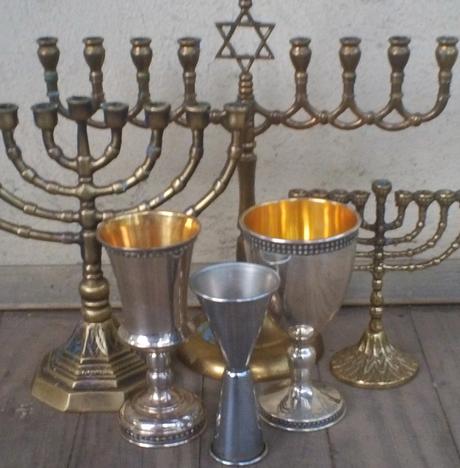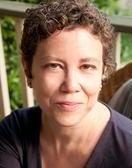 Photo Susan Katz Miller
Photo Susan Katz Miller My kids only had one Jewish grandparent, my father, may his memory be a blessing. When he died two years ago, I promised to chronicle what happens in an interfaith family when all the remaining generations have interfaith heritage.
So here, I'm reporting in.
According to Jewish pessimists, my children should be thoroughly assimilated into the (increasingly mythical) Christian majority by now. They are 26 and 23 years old, and just recently launched into the (perilous) world.
And in the last 24 hours, they each, independently, casually asked if I had a menorah to spare.
Oh, you know I do! I have a whole collection of them. (And yes, I call them menorahs, not chanukiahs, because that's what my father the rabbi's grandson called them).
So, I packed up one menorah, and it's headed to Brooklyn in the mail. It's the one with the star of David, and the wobble where the screw threads are worn out. Friends are incredulous. My son can't get his own menorah, in Brooklyn of all places? He can't just make a menorah out of ziti or something? Of course he can. But it's Hanukkah, and what else am I gonna give this grown-ass kid? He does not crave stuff. And he asked for this...one...thing.
Then my daughter came by to peruse my small menorah collection, and picked the teeny-tiny menorah that takes birthday candles. It will serve double-purpose as an instructional artifact in the Montessori forest school where she is teaching.
Coincidentally (or not, since Hanukkah starts this Thursday night), the New York Times just published a mournful piece by a woman with a Jewish father and Christian mother, about why she is not going to celebrate Hanukkah with her toddler. On twitter, reactions are split. I see exclusivist Jewish thinking ("you're not Jewish anyway so why would you celebrate Hanukkah"), the same thinking that has pushed so hard against the very existence of interfaith families in the name of "Jewish continuity." And then I see those who empathize, and diagnose her alienation as a direct result of those exclusivist policies. That toddler, like my children, has one Jewish grandparent. And while every interfaith family has the right to choose how they will identify, and which rituals they will celebrate, it set me to thinking about why my children do feel connected to Judaism, in the third generation of our interfaith family.
How do I explain why both my children now feel called to be interfaith ambassadors and bridge-builders? Why do they intend this year to share ancient Jewish ritual with their households of friends, with young pupils, with their communities? Here I want to name just two of what I see as the many interconnected reasons for the persistence of Jewish ritual in the third generation of my interfaith family.
One reason was the charisma and determination of my beloved Jewish father, who was the last living grandparent for my children. At Hanukkah, we would gather around his piano to sing " Rock of Ages" each night while he played for us by the light of the menorah, with my Episcopalian mother and husband harmonizing. He gave us affection for these rituals, and he gave us a model of a harmonious interfaith family that persisted in celebrating both heritages despite all manner of official resistance from religious institutions.
The second reason is the work that my husband and I, and our interfaith families community, and our rabbis and ministers, put into raising our children to feel they have a right to claim both family religions. We made sure they had basic Jewish literacy, we made sure they felt connected to Judaism, we made sure they felt called to stand up against anti-semitism.
In light of the menorah requests this week, I now feel moved to declare that this is the moment, sixty years into our three-generation experience with interfaith family living, that I am ready to draw a definitive conclusion. Interfaith kids in the third generation, including those raised with both family religions, can feel deeply connected to Judaism (or any other religion in which they are educated). So, to all those who predicted our inevitable assimilation into the Christian majority, I conclude based on personal experience that you were wrong.
But if Jewish institutions want to ensure that menorahs do not all end up sitting unused in boxes in closets, they must ensure that we do not continue to alienate interfaith families who want to engage in Judaism. Here are the five urgent (overdue) strategies for doing that:
And if you need further advice on the hows or whys of all this, I am available to consult.
Journalist is an interfaith families speaker, consultant, and coach, and author of Being Both: Embracing Two Religions in One Interfaith Family (2015), and The Interfaith Family Journal (2019). Follow her on Twitter @susankatzmiller.
